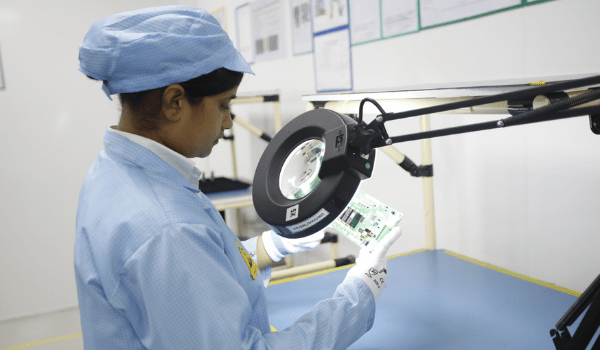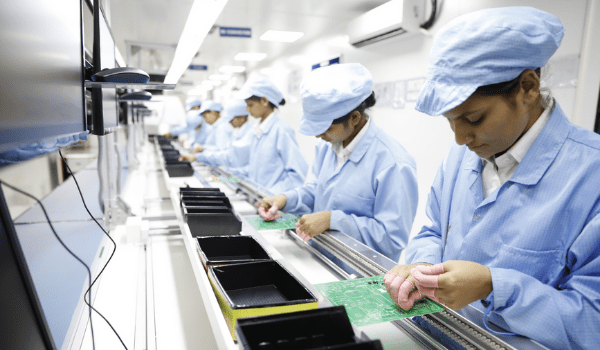From the beginning itself, the founders and chairman of Syrma Technology, which is an electronic manufacturing services company and part of the Tandon Group, have believed in and fought for increasing employment amongst India’s women, especially those from the rural areas. When it comes to manufacturing, there is a misconception that the sector is meant for and dominated by men. Most people can imagine only men working at the shop floors. The automotive industries are still ruled by men. At Syrma Technology, the story is different. Only about 10 per cent of its workforce at the manufacturing units comprises men! Surprised? Don’t be, because there is a reason behind this.
Syrma Technology is one of the key manufacturers of products such as Radio Frequency Identification (RFID) solutions — tags and readers — used in inventory and asset tracking, in India. Additionally, it manufactures lighting components for the home appliances and automotive industry, such as cars, as well as devices used in defence. All these electronic components and chips are very small in size, and therefore, strong eye-hand coordination, high level of finger dexterity and immense focus are required to assemble them. The work involves handling of minute components — as small as 0.5mm in size — and soldering of components in 10X magnification.
Sreeram Srinivasan, CEO, Syrma Technology informes that women are found to be better than men in such skills. That is why, at Syrma, almost 90 per cent of the shop floor assembly line is ruled by women. Kanchipuram district in Tamil Nadu is known for their weavers, and Syrma Technology’s talent-acquisition strategy — at its assembly lines and shop floors — targets such communities that come with innate skills of handling minute components and great hand–eye coordination skills. “Many researches and studies prove that women are better equipped with intense focus and finger dexterity to deal with minute components, as compared to men,” says Srinivasan. He mentions that the girls at the manufacturing facilities are so focussed that, if anyone walks across the corridors near the workstations, they do not even lift their heads to see who is walking by.
“Many researches and studies prove that women are better equipped with intense focus and finger dexterity to deal with minute components, as compared to men”
Sreeram Srinivasan, CEO, Syrma Technology
In addition to tapping the traditional weaving clusters in Kanchipuram, the Company also recruits young girls with ITI diplomas. In fact, it believes in hiring young girls in the 18 to 20 years age bracket, who can work with greater energy and focus at the plants.
Syrma hires almost 1000 people at the shop floor annually, on an average. The selected candidates then go through an initial 15-day training at its skill development centres. The training combines classroom sessions and e-learning modules. During this time, the new recruits also start working on some minor assembly-line functions under the supervision of mentors. Srinivasan says that in almost six months, these new recruits are almost ready for full-time shifts and are able to master expertise at work. In fact, as a talent-acquisition strategy, the Company gives preference to women for these roles at the shop floors. Syrma also ensures that working shifts are comfortable for all women and they do not burn out or feel fatigued from too much work. During the training, the focus is more on making workers more aware of the SOPs and how they can deliver the best quality. These girls also interact with the clients and customers to understand their needs and requirements, which ensures that the purpose of their job is aligned with the business.
High attrition rate, which ranges from 12 to 15 per cent, is a major issue for the Company. “Some players in the industry poach our talent. They buy our ready-made, skilled talent. With margins being so tight in our business, we can only offer compensation up to a certain level,” shares Srinivasan. The reason why the Company loses its internally-developed and groomed talent is because some players in the market get huge orders from large companies, and to meet the demand they require ready-made talent immediately. They lure these women with higher compensation to meet urgent demand. However, Srinivasan points out that such companies only require labour for a limited period of time. Many a time, these girls come back to Syrma after they are laid off by their previous employers.

Giving preference to women for such roles at the shop floor is not something new in their industry. However, the way Syrma has put in place a unique and structured programme for developing and upskilling the talent pipeline. In fact, because of attrition and growth happening together, Syrma has to plan and hire three to four batches in advance to meet talent demand and supply chain requirements.
“Many people wonder why we invest so much in hiring and developing talent, which actually ends up leaving us. Our philosophy has been to contribute to the country by developing and adding self-reliant and independent women to the workforce. These girls, who come from rural backgrounds, with no industrial experience at all, are now independent and skilled enough to earn for themselves,” asserts Srinivasan.
Though the attrition rate is high, the Company has tried to retain this talent by introducing a self-growth plan, wherein opportunities are given to shop-floor workers to climb up the ranks and also move into leadership roles. The Company tries to build a career path for its women employees and to retain them as far as possible.

At the management level and middle level, the Company has a dedicated elite-leadership programme designed to hire and promote women from reputed colleges in various management roles.
Currently, Syrma Technology has almost eight manufacturing facilities across India with almost 2500 people working in them. The main manufacturing plant is in Chennai, where the Company is headquartered.
Value our content... contribute towards our growth. Even a small contribution a month would be of great help for us.
Since eight years, we have been serving the industry through daily news and stories. Our content is free for all and we plan to keep it that way.
Support HRKatha. Pay Here (All it takes is a minute)




































